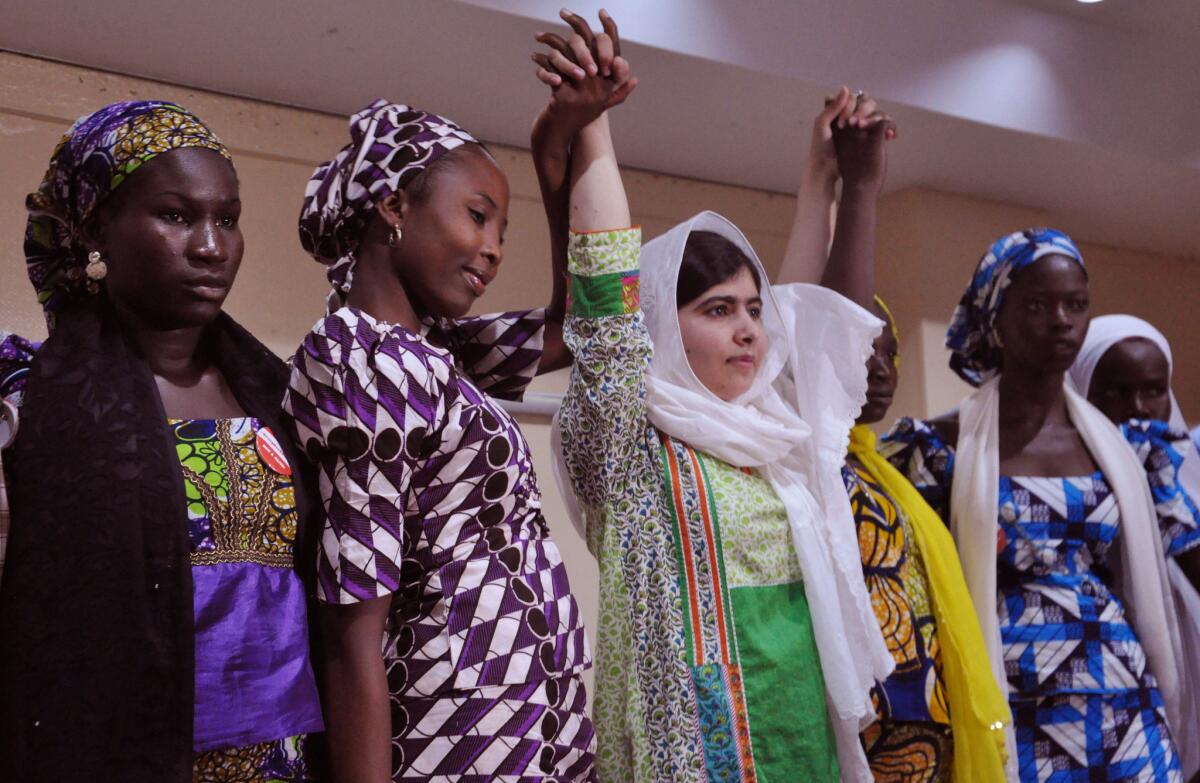Asteroid’s name skyrockets across social media

- Share via
Two former colleagues at the Jet Propulsion Laboratory found themselves in the center of a media whirlwind last week when word got out they’d named an asteroid for Pakistani activist and the world’s youngest Nobel Prize laureate, Malala Yousafzai.
Dr. Amy Mainzer, an astronomer at JPL and then-postdoctoral fellow Dr. Carrie Nugent used data collected by an infrared space telescope to detect an asteroid about 4 kilometers in diameter orbiting in between Mars and Jupiter.
As the discoverers, the pair had earned the right to name the asteroid. Having already had bodies named after them (234750 Amymainzer and 8801 Nugent), the sky was the limit.
Now working as a staff scientist at Caltech, Nugent said that while tribute is often paid to famous men in history, there are far fewer astronomical bodies named for notable women, a point both she and Mainzer were keen to correct.
Malala — a Pakistani girl who’d received death threats from the Taliban for insisting on getting an education and was shot in 2012 by an unknown gunman while riding a bus — seemed like the perfect person on whom to bestow such a distinction, Nugent said, since she’d defended her right to learn with her very life.
“When Amy and I heard Malala’s story, we just thought she’d be an excellent candidate,” the scientist recalled in an interview Tuesday.
So with the name Malala in hand, the pair was ready to submit a request. That’s when the real fun began.
“There are all these interesting rules about asteroid nomenclature,” said Nugent, a self-professed asteroid-naming hobbyist. “Once you discover it, you have the right to name it, but there’s a catch.”
The catch relates, in part, to the immense bureaucratic cataloging that goes into the process. Also, despite the fact that an agency like JPL has the ability to discover and submit numerous asteroids, the International Astronomical Union limits requests to two per month.
A discovered asteroid is first given a provisional designation intended to pinpoint its date of discovery. After its orbit has been determined, the asteroid gets a sequential number, in Malala’s case, 316201. When an asteroid is close to receiving a name, other IAU rules and guidelines apply.
For example, Nugent explains, only stable bodies with zero risk of plummeting toward Earth in a fiery plume are allowed to be named after an actual human being. Otherwise, one runs the risk of blowing, say, “Benfranklin” to smithereens for the good of all humanity.
In the annals of asteroid-naming history, one can explore those named for their discoverers, or for other points of apparent inspiration, such as Sagan, Bilbo or Donald Duck.
Nugent’s own informational dives into IAU’s archives have led her to 88705 Potato, commemorating 2008 as the International Year of the Potato, 95962 Copito, named to memorialize a beloved Spanish albino gorilla and 6510 Tarry, named to honor a friend who helped the discoverer weather a personal tragedy.
After 316201 Malala was officially named, Mainzer posted news on the Malala Fund Blog, whose administrators then relayed it through social-media outlets. The story has since spread across the globe and landed in Malala’s native Pakistan.
Word has bounced from CNN to BBC and pinged through Twitter, where it was transmitted by Chelsea Clinton, Nugent reported.
“It’s so exciting to see so many people care,” she added. “We’ve actually named asteroids for other famous women in history, like Rosa Parks, Harriet Tubman and Sojourner Truth. But it’s really this Malala one that’s catching people’s attention.”
